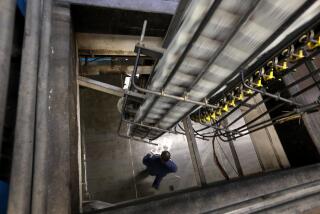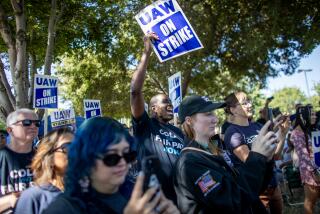Business Carries On to the Strain of News : War reaction: Workers in an Anaheim manufacturing plant find it difficult to do their work and keep up with reports from the Persian Gulf.
- Share via
ANAHEIM — On the factory floor, Brian Guth kept his eyes on the bright orange utility cart he was assembling Thursday as he cocked an ear towards the speaker above his head.
Most days, the speaker blares vintage Led Zepplin or Doobie Brothers into the expansive assembly area at the Taylor-Dunn plant in Anaheim. But even though the same rock music station was tuned in Thursday, Guth listened intently for snippets of war news.
“I’m really lucky that I work under the speaker,” he said.
From time to time, Guth traded the latest combat information with another worker across the floor who wore portable headphones to hear the latest from an all-news station.
The first full day of the Persian Gulf War had become one of those cataclysmic news events, like the assassination of President John F. Kennedy or the crash of the space shuttle Challenger, that had workers riveted to the news even though they had to spend the day at work.
Like workers in thousands of other Orange County businesses, the employees of Taylor-Dunn clustered around desks and work tables to talk about the conflict over morning coffee. Newspapers were passed around in the sales offices and the shops.
Productivity clearly was suffering, but managers were understanding. They, too, were caught up in keeping up with the rapidly unfolding events overseas.
At lunchtime, some employees listened to the latest news on car radios. One assembler, Army veteran David Ehlen, said he had enough time to duck home for a few precious minutes of television coverage.
Taylor-Dunn, an assembler and importer of golf carts and other small gasoline- and electric-powered vehicles, is an established manufacturer where many of the approximately 200 workers have been employed for 15 years or more. They are a close-knit, flag-waving bunch.
From their morning discussions, there seemed to be nearly plantwide consensus: The military has done a bang-up job in the Persian Gulf and President Bush should be lauded for his tough decision.
“Everyone is really upbeat,” said quality control inspector Linda Schlink.
That was the mood through the workday. By the time the Iraqis had lobbed missiles into Israel in the late afternoon, the factory was already closed.
While none of the company’s employees are currently serving in the gulf, two workers are awaiting the call-up of their reserve units. Milton L. Sneller, the firm’s executive vice president, said the company had sold 15 heavy-duty utility carts to the Navy, but he is not sure whether they are seeing gulf duty.
The company, however, does have plenty of carts seeing golf duty, including one that was once used to ferry the Queen Mother of England around a car factory.
As the day wore on Thursday, each of the employees seemed to have found his or her own way of keeping abreast of fast-breaking events. Manufacturing technologist Kevin K. Hunter works behind a computer terminal in a quiet office, but walks through the shops often enough that he could pick up the news from fellow workers.
Senior buyer Marie Owens said she swarmed over the morning newspapers in her office and swapped tidbits with vendors over the phone. And Randy Egbert, a service mechanic and an Army Military Police reservist, said he tried to kept up through radio.
All the employees faced the challenge of trying to perform some meaningful work for the day when their minds were on allied forces in the Mideast.
“Sometimes it breaks your concentration at work. You’re trying to listen to the news.” said assembler Tony Garcia as he sat behind the wheel of a new cart.
More to Read
Inside the business of entertainment
The Wide Shot brings you news, analysis and insights on everything from streaming wars to production — and what it all means for the future.
You may occasionally receive promotional content from the Los Angeles Times.










